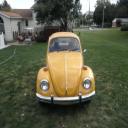Yahoo Answers is shutting down on May 4th, 2021 (Eastern Time) and beginning April 20th, 2021 (Eastern Time) the Yahoo Answers website will be in read-only mode. There will be no changes to other Yahoo properties or services, or your Yahoo account. You can find more information about the Yahoo Answers shutdown and how to download your data on this help page.
Trending News
Bleeding drum brakes in 1975 Beetle?
Me and my dad are restoring a 75 beetle and right now we are trying to bleed the brakes and cannot get adequate brake pressure. the pedal goes almost to the floor with little resistance. we put new drums, shoes, wheel cylinders, master cylinder, and hardware in. we adjusted the brake shoes, and followed the correct process for "pedal pumping" the brakes. we have done it several times and still from the left rear brake line we are getting air bubbles every other pump of the pedal. we checked for leaks and could not see any on any part of the line. what else could be wrong that we are missing? this has been bugging us for about 1 week. any insight would be appreciated. thanks.
4 Answers
- a car nutLv 61 decade agoFavorite Answer
DId you bleed the master cylinder prior to being installed? Normally, one needs to bleed the master cylinder before connecting up the lines to the new master.
Ideally, you want to pressure bleed the system using either a professional or home pressure bleeder to get all the air out. Still, I bleed the master cylinder the "old way," manually before installing the master.
Did you plug the lines out, (of the master) then pump the brake pedal until it became firm before removing the plugs and reinstalling the fluid lines out? Or, install a master cylinder bleeding kit with plastic lines and hardware, then attempt to bleed the master?
It could also be that the new master cylinder is defective.( or that the wheel cylinder has a problem).. It doesn't happen very often, but it does happen. I know, I've probably gotten two or three new master cylinders that I couldn't bleed and build pressure on over the last 30+ years.. VW even has a pressure tool (goes back to the days before the Dasher!!) that we use once in a while to determine faults with the scanner on early ABS system problems...
My suggestion is that you re-bleed the master cylinder (even if you have already done so) using a universal master cylinder bleeding kit (comes with plastic hoses, several metric plastic fittings and plugs) and follow the directions very carefully. Once you've done retry and see if you can bleed the brakes and get all the air out of the system.
If it works now, terriffic; otherwise you'll need to spend more time checking out the system. One possiblity is that the wheel cylinder could be bad, but usually if this happens you'll notice a fluid leak.
Open the outer dust cover boot and see if you have brake fluid seeping by..some manufacturers put fluid into the wheel cylinder to keep from rusting internally while in storage, so some "moistness" inside the cup is normal, but you shouldn't see fluid per se.
If all else fails, I hate to say this, but, you need to take it to a local garage and have them inspect and repair the system.
Any way, I hope this helps at least a little.
Source(s): 25 years on/off in Volkswagen dealership service departments; 30+ years in automottive service - ca_surveyorLv 71 decade ago
Well, lets begin with the obvious. Something either has a lot of air in it or it is leaking.
1) Is it a GOOD master cylinder. I know its new, but that does not mean that it might not be bad. Plug all of the outbound lines and pump it up. Does it hold.. ?
2) Did you bleed the master cylinder before you connected the lines up? It holds a LOT of air so step one may also solve the problem.
3) OK.. so the master cylinder checks out.. now connect up one line at a time and pump away.. If one of them does not pump up then look to the slave cylinder for that wheel. (or the disk caliper)
Brakes are a mechanical issue, so these steps should let you isolate the problem to one specific area. Once you get it nailed down you can fix it.
Personally, I suspect the master cylinder and, given all the pumping you have been doing I think you will find it to be bad.. but hey. that's just a guess.
.
- bill fLv 41 decade ago
You have to make absolutely sure that the master cylinder brake fluid reservoir does not get low on fluid or air will be re-introduced to the system and you have to start all over. You can bleed master cylinder by cracking lose the brake lines where they hook up to it and pumping some fluid through the MC. re-tighten lines and waste a can of brake cleaner in the area of the MC to clean up the mess. Then start over at the right rear to the left rear, to the right front , to the left front, check level in MC reservoir every fricken second. Make sure you adjust the new brakes up tight before you start bleeding, it will go faster, Brakes should be re-adjusted when done bleeding, then go around the block using the brakes alot and adjust again after the shoes have settled into place from the short ride.
- kelly_f_1999Lv 71 decade ago
type into search box
how to replace rear brake shoes
how to adjust rear brake shoes
how to bleed brakes
add video to end of any of these might get one to watch it done..





